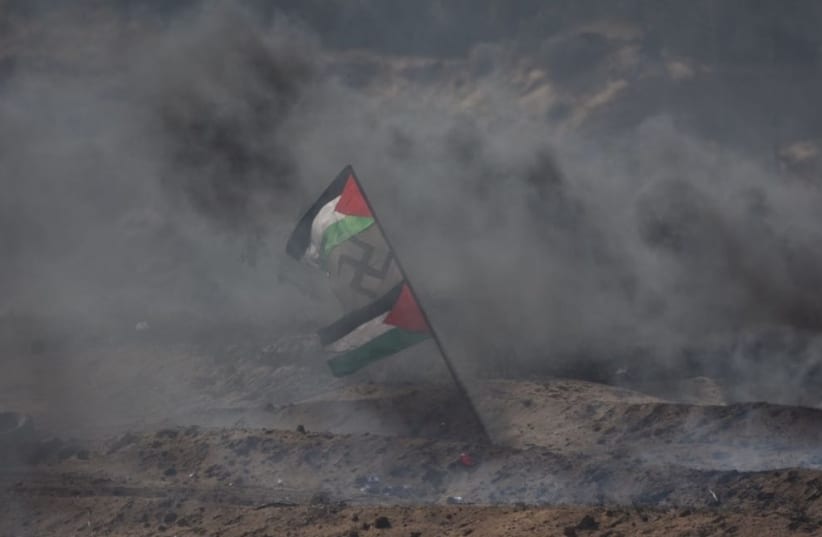Hamas and Palestinian Islamic Jihad have threatened to resume weekly protests near the Gaza-Israel border if there is no progress in talks to improve the economic and humanitarian situation in the Hamas-ruled Gaza Strip.
The threat was relayed to Israel through Egypt, Qatar and other mediators, according to Palestinian sources who said the groups were “running out of patience” because of a lack of progress in efforts to ease restrictions imposed on the Gaza Strip.
The 2018-2019 Gaza border protests, dubbed by Palestinian organizers as the “Great March of Return,” were a series of weekly demonstrations during which Palestinians clashed with soldiers.
The demonstrators demanded that the descendants of Palestinian refugees be allowed to return to their former villages and cities in Israel. They also protested against the restrictions imposed on the Gaza Strip.
The Palestinian groups have decided “to step up pressure along the borders of the Gaza Strip” after a period of relative calm during Eid al-Adha (Feast of the Sacrifice), the Hezbollah-affiliated newspaper Al-Akhbar reported.
The planned escalation aims to push forward the ongoing discussions on the issues related to the Gaza Strip, particularly the humanitarian and economic situation, the report said.
Over the past two days, incendiary balloons have been launched from the Gaza Strip into Israel as part of the move to escalate tensions along the border, and Palestinian terrorist groups are heading in the coming days toward a gradual escalation with Israel, which will start with launching balloons carrying explosive devices, Palestinian sources told Al-Akhbar.
The factions are eyeing the possibility of “activating new pressure tools, including the resumption of the Great March of Return,” they said.
Israel’s new government is practicing a policy of “arm-twisting” by limiting the entry of various goods into the Gaza Strip, including construction materials, said Rami Abu al-Rish, a senior official at the Hamas-controlled Ministry of Economy.
The Egyptians recently resumed talks with Hamas leaders with the aim of achieving a prisoner-exchange agreement with Israel and moving forward with the reconstruction of buildings that were damaged or destroyed in Gaza’s 11-day military confrontation with Israel in May.
“The renewed contacts coincide with the return of the Egyptian engineering delegation to the Gaza Strip to resume operations to remove the rubble of the destroyed buildings,” a Palestinian source said.
The removal of the rubble will be completed within a month, paving the way for reconstruction, according to Hamas officials.
The Israeli restrictions on admitting construction materials into Gaza and the absence of an agreement on a mechanism for delivering Qatari funds are likely to hinder the start of the second phase of reconstruction, the sources said.
On Monday, Hamas and Palestinian Islamic Jihad (PIJ) officials continued to issue threats against Israel.
More pressure on the Gaza Strip would lead to an explosion, Hamas spokesman Abd al-Latif al-Qanou said.
“Our people will not be patient for too long over the lack of reconstruction and the reluctance to take measures to break the siege,” he said.
The continuation of restrictions on the Gaza Strip would lead to an escalation, PIJ leader Khader Habib said.
Israel “will suffer the repercussions because it prevents the entry of necessary supplies, and mediators should exert pressure on Israel to fulfill its responsibilities,” he said.
The lack of progress was due to the new Israeli government’s “lack of political experience” and “internal differences,” senior Hamas official Hussam Badran was quoted as saying on Monday.
The change of Israeli governments does not concern Hamas, he said, adding that “whenever we feel that there is some kind of hesitation and obstruction of negotiations to install the ceasefire and lift the siege on Gaza, we will resort, in agreement with the factions, to various tools to pressure the occupation.”
Regarding efforts to rebuild the Gaza Strip, experience has shown that some countries do not follow through on their commitments to help the Palestinians, Badran said.
“Hamas will not allow any country to use its donation to rebuild the Gaza Strip to put pressure on the Palestinian resistance groups,” he said.
